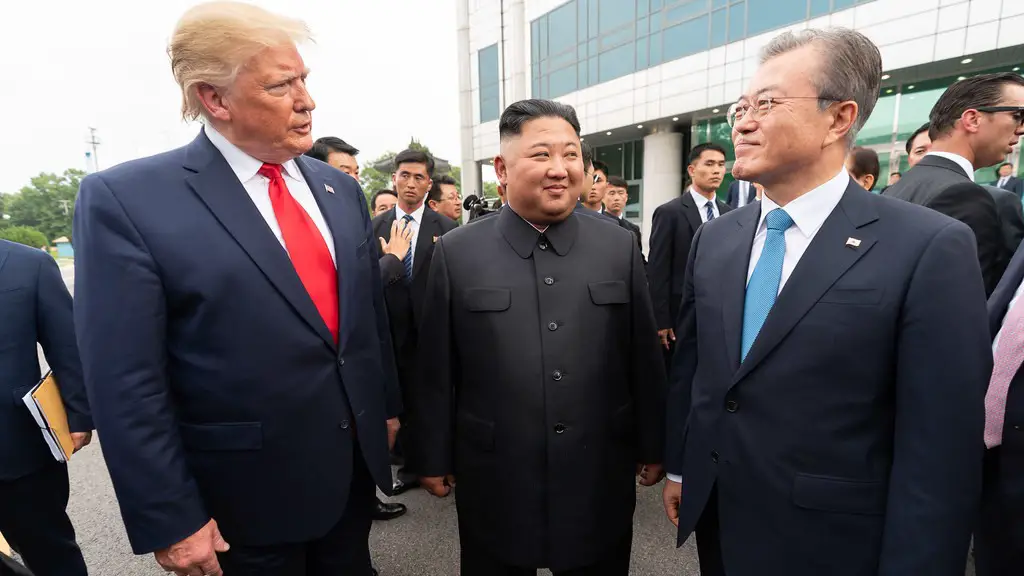Negotiations and Treaties
Negotiations between North Korea and South Korea began in 1972, with the two sides agreeing to establish contact points in the Demilitarized Zone (DMZ). This contact point had the goal of de-escalating tensions, but little progress was made due to North Korea’s refusal to accept South Korea’s demands of economic sanctions. In addition, South Korea was unwilling to recognize North Korea as a separate nation, which further strained diplomatic relations. Ultimately, the negotiations ended in stalemate, and relations between the two countries remain strained to this day.
The only notable breakthrough between the two countries was the 1992 Joint Declaration of South and North Korea, which called for a cessation to hostilities and a commitment to begin economic and social cooperation. This document, coupled with the 1994 Agreed Framework and the 2000 Summit of the Inter-Korean Dialogue, resulted in the loosening of tensions between North and South Korea. However, these agreements ultimately proved to be largely symbolic and did little to stop North Korea from pursuing its nuclear weapons development.
In 2008, North and South Korea signed an agreement to pursue peace and cooperation, but this was abandoned by North Korea in 2010 due to disagreements over the participation of outside forces in the negotiations. North Korea has since refused to recognize South Korea as a separate nation and continues to call for the reunification of the country under its control.
Political and Ideological Differences
The political and ideological differences between North Korea and South Korea are the root cause of their conflict. North Korea is a highly authoritarian government while South Korea is a democracy. North Korea is led by a family dynasty, while South Korea has a freely elected president and legislature. In addition, North Korea follows the Juche ideology, which is based on self-reliance, while South Korea is open to international trade and investment.
The ideological differences between North and South Korea have been largely responsible for the harsh economic sanctions placed upon the North. North Korea’s refusal to adhere to international standards on human rights and the proliferation of nuclear weapons have resulted in the imposition of sanctions which have crippled the nation’s economy and led to severe shortages of food and medicine.
North Korea has repeatedly called for the reunification of the Korean Peninsula, but South Korea has so far refused to agree to any such move. South Korea has expressed its commitment to maintaining a peaceful and cooperative relationship with North Korea, but it has also stressed its commitment to the defense of its territories and its citizens.
Internal and External Factors
The conflict between North and South Korea has been exacerbated by both internal and external factors. Internally, the legacy of the Korean War (1950-1953) has resulted in a high level of animosity between the two nations. In addition, the cultural and linguistic differences between the two Koreas have also hindered efforts to establish cooperative relations. Externally, the United States’ economic sanctions against North Korea have created a hostile environment between the two Koreas.
Furthermore, the United States’ hard-line stance against North Korea’s nuclear weapons program has made it difficult for South Korea to engage with the North. Moreover, China’s support for North Korea and its opposition to the US’s sanctions have also caused tensions to escalate. Finally, the presence of US troops in South Korea and the deployment of US nuclear weapons in the region has further exacerbated the conflict.
In recent years, the international community has sought to de-escalate tensions between North and South Korea. In 2018, South Korean President Moon Jae-in and North Korean leader Kim Jong-un met in the demilitarized zone and agreed to pursue peace talks. However, in 2019, North Korea resumed its nuclear weapons program and declared its intention to develop a long-range nuclear missile, resulting in a further deterioration in relations.
Relationship with the United States
The United States has long been an advocate for the unification of the Korean Peninsula, calling for North and South Korea to resolve their differences and work towards a peaceful and prosperous future. However, its relationship with North Korea has been characterized by hostility due to North Korea’s pursuit of nuclear weapons and its refusal to recognize South Korea as a separate nation.
The US has imposed a number of economic sanctions against North Korea in an effort to curb its nuclear pursuits and has also vowed to defend South Korea should a conflict erupt. Ultimately, the US seeks to bring the two Koreas closer together through peaceful negotiations and diplomatic initiatives. However, its current policy of maximum pressure has resulted in the further deterioration of relations between North and South Korea.
Conclusion
Though North and South Korea have signed a number of agreements in an effort to foster peace and harmony, the relationship between the two countries remains fraught with tension and mistrust. The political and ideological differences between the two Koreas, as well as external factors such as the US’s economic sanctions and the presence of US troops in the region, have contributed to the deterioration of relations. Currently, the only way to de-escalate tensions is for North and South Korea to begin negotiations and to focus on finding a path towards peace and reconciliation.



